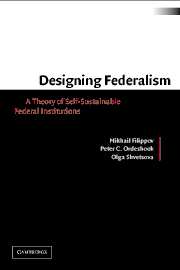Book contents
- Frontmatter
- Contents
- List of Figures
- List of Tables
- Preface
- Acknowledgments
- 1 Federations and the Theoretical Problem
- 2 Federal Bargaining
- 3 Two Cases of Uninstitutionalized Bargaining
- 4 Representation
- 5 Incentives
- 6 Political Parties in a Federal State
- 7 Institutional Sources of Federal Stability I
- 8 Institutional Sources of Federal Stability II
- 9 Designing Federalism
- References
- Name Index
- Subject Index
6 - Political Parties in a Federal State
Published online by Cambridge University Press: 03 December 2009
- Frontmatter
- Contents
- List of Figures
- List of Tables
- Preface
- Acknowledgments
- 1 Federations and the Theoretical Problem
- 2 Federal Bargaining
- 3 Two Cases of Uninstitutionalized Bargaining
- 4 Representation
- 5 Incentives
- 6 Political Parties in a Federal State
- 7 Institutional Sources of Federal Stability I
- 8 Institutional Sources of Federal Stability II
- 9 Designing Federalism
- References
- Name Index
- Subject Index
Summary
Political parties created democracy and … modern democracy is unthinkable save in terms of parties.
Schattschneider 1942: 1Here is a factor in the organization of federal government which is of primary importance but which cannot be ensured or provided for in a constitution – a good party system.
Wheare 1953: 86Whatever the general social conditions, if any, that sustain the federal bargain, there is one institutional condition that controls the nature of the bargain in all instances … with which I am familiar. This is the structure of the party system, which may be regarded as the main variable intervening between the background social conditions and the specific nature of the federal bargain.
Riker 1964: 136In a country which was always to be in need of the cohesive force of institutions, the national parties, for all their faults, were to become at an early hour primary and necessary parts of the machinery of government, essential vehicles to convey men's loyalties to the state.
Hofstadter 1969: 70–1An Extreme Hypothesis
Hofstadter's argument is drawn from his assessment of the United States, but like the views of Schattschneider, Wheare, and Riker, that argument can apply to any stable democratic state. If the primary objective of political elites in a democracy is to win and maintain office and if political parties are the primary organizational vehicle for achieving that end, then parties and their relation to the state must play a pivotal role in any understanding not only of democracy generally but of the intergovernmental relations of federations in particular: “[P]olitical parties are the main means not only whereby provincial greivances are aired but also whereby centralist and decentralist trends are legitimized” (McKay 2001: 16).
- Type
- Chapter
- Information
- Designing FederalismA Theory of Self-Sustainable Federal Institutions, pp. 177 - 225Publisher: Cambridge University PressPrint publication year: 2004

